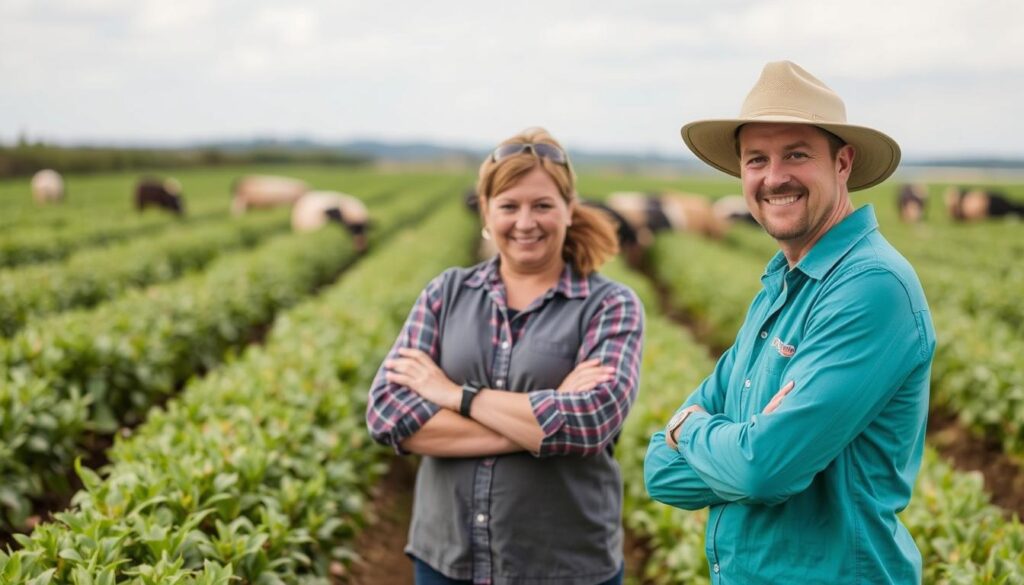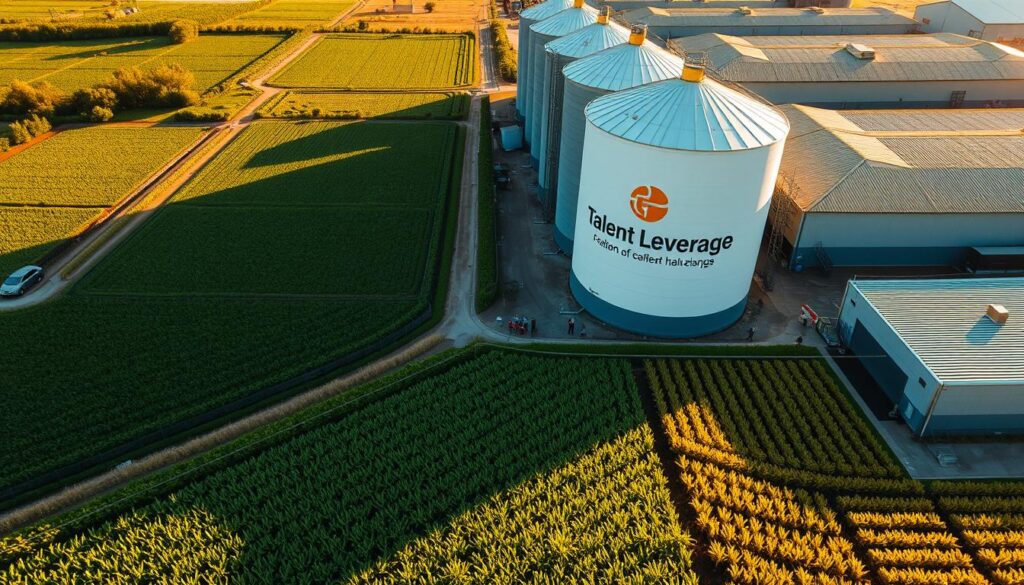For U.S. farms and agribusinesses, hiring demands never stop—and every vacant role can derail operations. With skilled labor scarce, fierce competition for workers, and recruiting costs soaring, even one empty position can grind production to a halt and drain profits. On-demand recruiting cuts through the chaos by delivering qualified talent exactly when and where you need them, so no season is ever missed and your business keeps growing. Finding the right talent for your farm or agribusiness can be a daunting task with not many recruiters focusing in the field. The farming industry faces unique staffing challenges that require specialized knowledge, abilities, and networks to overcome.
As the demand for food systems production increases, so does the need for skilled workers to manage crops, land, machines, fleets, and more effectively. At Talent Leverage, our expert recruiters understand the intricacies of the farm management landscape and are dedicated to helping you find the right people for the job.
One of our most recent Agribusiness engagements, Columbia Fruit, enjoyed recruiting a sales leader for their fruit division, 2 mechatronic tech’s, and a dales leader for their seed division. There awarded candidates came from both local and national talent pools.
With on-demand recruiting, you can access top talent without the need for a full-time HR department, or in conjunction with, allowing you to focus on what matters most – growing your business and improving your bottom line.
The Current State of Agricultural Employment
With 873 million people employed in agriculture globally as of 2021, the sector’s employment challenges are both critical and complex. The share of this industry in global GDP has remained stable at around 4% since 2000-2023, despite a decline in the global workforce percentage from 40% to 27% over the same period. This statistic is crucial to understand when you need to hire the best. Regardless of your hiring solution, one thing is clear… stop wasting your money on ads. The best candidates are recruited from your competitors by qualified experts like Talent Leverage.
This significant shift underscores the need to examine the current state of farming and the challenges it faces in agricultural development. The food production landscape is becoming increasingly complex, driven by technological advancements, changing consumer demands, and the need for sustainable practices.
Key Challenges Facing Farm Businesses Today
Farm businesses today face a multitude of challenges, from adapting to new technology to managing the workforce effectively. Some of the key issues include:
- The need for workers skilled in data analysis and technology
- Increasing complexity of modern agricultural equipment
- Food safety regulations requiring detailed knowledge of compliance procedures
- The demand for sustainable farming practices that require specialized knowledge of soil health and ecological systems
- Shortage of technical talent ranging from mechanics to technicians
These challenges highlight the necessity for a skilled and adaptable workforce in agriculture.
If you would like a free consultation on your hiring needs, email us today at search@talentleverage.com.
The Growing Skills Gap in Agriculture
The development of new crops and agricultural products requires scientific knowledge that traditional agricultural education often doesn’t provide. There’s a growing disconnect between the skills imparted through agricultural education and the needs of modern agriculture from experience. This gap is further exacerbated by:
- A decline in agricultural education programs
- A lack of exposure to agriculture among young people with technological aptitude
- The need for workers with both practical farming experience and business acumen
Addressing this skills gap is crucial for the future of food production and the success of agricultural businesses. As the industry continues to evolve, it’s essential that we focus on developing the people and the system that will drive it forward.

Why Strategic Hiring Matters in Agriculture
As the agricultural industry continues to evolve, the need for strategic hiring practices has become increasingly evident. The success of farm operations and agribusinesses hinges on their ability to attract and retain top talent. At Talent Leverage, our Agriculture Recruiters have decades of combined experience successfully recruiting the most qualified and culturally fit candidates, resulting in increased retention rates, better team dynamics, and a growing bottom line.
Impact of Quality Talent on Farm Productivity
The impact of quality talent on farm productivity is multifaceted. High-quality employees bring expertise and dedication, directly influencing the efficiency and effectiveness of farm operations. In agriculture, where the work is often seasonal and the margin between profit and loss can be thin, having the right people in the right roles is crucial. Quality talent can lead to improved change of food production, better management, and more efficient operations.
Moreover, skilled farm managers and workers can make informed decisions about plant and crop management, equipment operation, and maintenance, ultimately contributing to the sustainability and profitability of the agricultural business.
The Cost of Poor Hiring Decisions
Conversely, poor hiring decisions can have far-reaching and costly consequences for agricultural businesses. Mistakes in hiring can lead to reduced productivity, increased training costs, and potential safety hazards. Some of the specific challenges include costly mistakes in crop management, the financial impact of hiring the wrong account managers, and substantial training costs for skilled trades positions.
- Mistakes in equipment operation by unqualified staff can result in costly repairs and dangerous working conditions.
- Poor cultural fits in agricultural teams can create workplace tension, reducing overall productivity and increasing turnover.
- The seasonal nature of farming means hiring mistakes often can’t be corrected until after critical growing periods have passed.
- Inexperienced farm managers may make land use decisions that have long-term negative impacts on soil health and farm sustainability.
- Food safety errors by improperly trained staff can lead to regulatory violations and potentially catastrophic liability issues.
The true cost of poor agricultural hiring extends beyond immediate financial impacts to include lost opportunities for innovation and growth. By understanding these challenges, agricultural businesses can appreciate the value of strategic hiring practices.
If you would like a free consultation on your hiring needs, email us today at search@talentleverage.com.
Understanding On-Demand Agriculture Recruiting

As the agricultural sector continues to grow, on-demand recruiting is emerging as a key strategy for finding the right talent. This approach allows agricultural businesses to quickly adapt to changing talent and labor needs, whether it’s due to seasonal fluctuations, unexpected staff departures, or growth.
On-demand agriculture recruiting offers a flexible and scalable solution to the staffing challenges faced by farm operations and is a great solution to access top talent without breaking the bank every time. By leveraging specialized recruiting services, agricultural businesses can access a pool of qualified candidates without the need to maintain an in-house recruiting infrastructure.
Traditional vs. On-Demand Recruiting Models
Traditional recruiting models often involve significant costs (25-30% of candidates 1st year salary) and lengthy processes, which can be detrimental to agricultural businesses with limited resources and fluctuating labor needs. In contrast, on-demand recruiting acts as a cost controlled solution, provides the flexibility to scale hiring efforts up or down as needed, aligning with the cyclical nature of farming operations.
- On-demand agriculture recruiting allows farm operations to quickly scale up during expansion phases without building internal recruiting infrastructure.
- Seasonal operations benefit from the ability to activate intensive recruiting support during pre-harvest periods and scale back during off-seasons.
- Agricultural businesses and farmers experiencing unexpected staff departures can rapidly access recruiting support without maintaining ongoing recruiting expenses.
Flexibility and Scalability Benefits
The flexibility and scalability of on-demand recruiting are particularly beneficial for agricultural businesses dealing with fluctuating labor demands. This approach enables farmers to adjust their hiring strategy in response to changing market conditions, crop planning, or other factors affecting their operations.
- The scalable nature of on-demand recruiting allows farms to adjust their hiring approach based on changing market conditions or crop planning.
- Specialized operations can access recruiters with specific expertise only when needed for particular positions.
- On-demand recruiting provides flexibility to pause hiring efforts during challenging financial periods without breaking contractual commitments.
- Agricultural businesses can test new positions or departments with targeted recruiting support before committing to permanent staffing structures.
By adopting on-demand recruiting, farms and agribusinesses can optimize their staffing processes, improve productivity, and ultimately contribute to a more stable food supply chain. This innovative approach to hiring is revolutionizing the way agricultural businesses find and retain talent, ensuring they are better equipped to meet the demands of a rapidly changing industry.
Core Agricultural Positions That Require Specialized Recruiting
The success of agricultural operations hinges on finding the right professionals for specialized roles. As the industry continues to evolve, the demand for skilled workers in various areas has become increasingly critical.
Management Roles
Effective farm management is crucial for the productivity and profitability of agricultural businesses. Recruiting for farm management roles requires identifying candidates with a strong background in agriculture and business management. These professionals must be able to oversee daily operations, make strategic decisions, and lead teams effectively.
Agricultural Scientists and Technicians
The development and implementation of new technologies and practices in farming rely heavily on agricultural scientists and technicians. These professionals work on improving crops yields, developing more sustainable farming practices, and ensuring the quality of food products. Recruiting for these roles demands a focus on candidates with the right scientific knowledge and practical experience.
Equipment Operators and Maintenance Specialists
The operation and maintenance of complex machinery are vital to the efficiency of modern farms. Equipment operators and maintenance specialists play a crucial role in ensuring that machinery is in good working order. Recruiting for these positions requires evaluating candidates’ technical skills and their ability to work with various systems.
Supply Chain and Logistics Experts
Supply chain and logistics experts are essential for getting products from the farm to the consumer. These professionals must navigate complex global systems, understand the needs of different countries, and ensure that food products are delivered safely and efficiently. The global nature of agriculture means that these experts need international experience and cultural awareness.
Sales and Account Executives
Professionals with a track record that can hit the ground running and utuilize their book of business are next to invaluable. This is one position that is 100% not worth bringing new employees in from the ground up. Our clients rely on us to provide top-tier sales talent to continue expediting their growth and market challenges.

If you would like a free consultation on your hiring needs, email us today at search@talentleverage.com.
| Role | Key Skills | Recruiting Focus |
|---|---|---|
| Management | Business management, leadership, agricultural knowledge | Strategic decision-making, team leadership |
| Agricultural Scientists and Technicians | Scientific knowledge, practical experience, innovation | Research skills, application of technology |
| Equipment Operators and Maintenance Specialists | Technical skills, machinery operation, maintenance | Hands-on experience, problem-solving |
| Supply Chain and Logistics Experts | Global logistics, cultural awareness, supply chain management | International experience, adaptability |
Recruiting for these core agricultural positions requires a deep understanding of the industry’s unique demands and the value that specialized professionals bring to the table. By focusing on the specific skills and qualities needed for each role, agricultural businesses can attract the talent necessary to drive their operations forward.
The Agriculture Talent Acquisition Process
Acquiring top talent is crucial for the success of any agricultural operation, and understanding the nuances of the talent acquisition process can make all the difference. In the agricultural sector, where the demand for skilled labor is high and the supply is often limited, having a strategic approach to hiring is essential.
The process begins with a clear understanding of your farm’s or agribusiness’s specific needs. This involves not just identifying the roles that need to be filled but also understanding the skills and qualities required for success in those roles.
Identifying Your Farm’s Specific Needs
Before starting the recruitment process, it’s vital to conduct a thorough analysis of your operation’s needs. This includes assessing the current workforce, identifying gaps in skills or personnel, and forecasting future needs based on the growth or changes in your operation. By doing so, you can create a targeted recruitment strategy that addresses your specific challenges.
Creating Compelling Job Descriptions
Crafting job descriptions that accurately reflect the roles and responsibilities of the positions you’re hiring for is crucial. These descriptions should not only list the required skills and qualifications but also give potential candidates a sense of your farm’s culture and values. This helps attract candidates who are not just qualified but also a good fit for your operation.
Effective Screening Techniques
The screening process is where you can significantly narrow down your pool of candidates to those who are most suitable. This involves reviewing resumes, cover letters, and potentially conducting initial interviews or assessments to gauge candidates’ skills and experience. Effective screening techniques help ensure that you’re considering candidates who have the potential to excel in your agricultural operation.
Interviewing Best Practices for Farm Employers
When it comes to interviewing candidates, a combination of traditional interview techniques and more practical assessments can provide a comprehensive view of a candidate’s abilities. This might include both office-based discussions and field tours to observe candidates in practical settings. Asking scenario-based questions related to crop production, and other relevant areas can help assess a candidate’s problem-solving skills and experience.

To further enhance the interview process, consider involving multiple team members to gain diverse perspectives on candidates. Using a standardized scoring system can also help in making an objective comparison between candidates. By adopting these strategies, farm employers can identify and hire the best talent for their agricultural operations, ultimately contributing to the success and sustainability of their businesses.
- Effective agricultural interviews include both office-based discussions and field tours to observe candidates in practical settings.
- Farm employers should include questions about specific soil management or crop production scenarios relevant to their operation.
- Professional interviewers balance technical assessment with evaluation of cultural fit within the unique environment of agricultural businesses.
By refining the talent acquisition process, agricultural businesses can secure the skilled workforce they need to thrive in a competitive industry. This not only involves finding candidates with the right technical skills but also those who align with the values and culture of your farm or agribusiness.

Data-Driven Hiring Decisions
Data-driven recruiting is transforming the agricultural hiring landscape. By analyzing metrics such as time-to-hire, cost-per-hire, and candidate sourcing channels, agricultural businesses can make informed decisions that improve their recruitment efficiency.
| Metric | Description | Benefit |
|---|---|---|
| Time-to-Hire | Measures the duration from job posting to candidate hire | Helps in optimizing the recruitment process |
| Cost-per-Hire | Calculates the total cost incurred to fill a position | Aids in budget allocation and cost management |
| Candidate Sourcing Channels | Identifies the most effective channels for candidate recruitment | Enhances the quality of hires by focusing on high-performing channels |
By embracing data-driven hiring decisions, farms can not only improve their recruitment processes but also enhance the overall quality of their hires, leading to a more productive and efficient agricultural workforce.
Building a Strong Employer Brand in Agriculture
In the competitive world of agriculture, establishing a strong employer brand is crucial for attracting top talent. As farms and agribusinesses vie for skilled workers, they must differentiate themselves by showcasing their unique culture, values, and contributions to the food we eat.
A strong employer brand not only attracts potential employees but also helps retain existing staff by fostering a sense of pride and belonging. In agriculture, where the connection to the land and the community is deep, this can be a powerful recruitment and retention tool.
Showcasing Your Farm’s Culture and Values
Your farm’s culture and values are the backbone of your employer brand. They define who you are, how you operate, and what you stand for in the agricultural community. To showcase these effectively:
- Highlight your commitment to sustainable practices and environmental stewardship, appealing to candidates who value the environment.
- Share stories of your farm’s history and the people who make it run, giving insight into your work culture.
- Emphasize your role in producing high-quality food and the impact you have on local communities.
By sharing these aspects, you not only attract candidates who share your values but also give them a glimpse into the work environment and the kind of people they’ll be working with.

Leveraging Social Media for Agricultural Recruitment
Social media has become an indispensable tool in recruitment, and agriculture is no exception. Platforms like Instagram and YouTube offer visual storytelling opportunities that can showcase the dynamic nature of modern farming and the variety of crops you grow.
Effective social media strategies include:
- Sharing behind-the-scenes content that gives candidates a realistic preview of farm life and the work involved.
- Utilizing employee takeovers to provide authentic perspectives on what it’s like to work on your farm.
- Highlighting your farm’s involvement in the community and your commitment to social responsibility.
“The future of agriculture depends on our ability to attract, retain, and develop talent that can drive innovation and sustainability.”
By showcasing your farm’s culture, values, and the meaningful work you do in producing food for communities, you can establish a compelling employer brand that attracts the right talent to your agricultural business.
Retention Strategies for Agricultural Businesses
The backbone of any successful farm or agribusiness is its ability to retain quality employees. In the agriculture sector, where skilled labor is crucial for maintaining productivity and ensuring the quality of food and crops, effective retention strategies are vital.
Retaining top talent in farming and agricultural businesses requires a multifaceted approach. It’s not just about offering competitive salaries; it’s about creating an environment where employees feel valued and supported in their work. This involves understanding the unique needs of agricultural workers and their families, and tailoring benefits and compensation packages accordingly.
Creating Career Pathways for Employees
One key retention strategy is to create clear career pathways for farm employees. This involves providing training and development opportunities that allow workers to enhance their skills and move into more challenging roles. By investing in their employees’ growth, agricultural businesses demonstrate their commitment to their workers’ long-term health and career satisfaction.
- Offer regular training sessions on new farming techniques and technologies.
- Provide mentorship programs that pair experienced workers with newer employees.
- Create opportunities for advancement within the organization.
Competitive Compensation and Benefits
Effective retention strategies also include offering competitive compensation and benefits packages. This means balancing base pay with performance incentives tied to production goals, as well as providing benefits that add value beyond salary, such as housing assistance, garden plots, or access to hunting and fishing areas.
| Benefit | Description | Value to Employee |
|---|---|---|
| Housing Assistance | Help with housing costs or provision of on-site accommodation. | Reduces living expenses, increases job attractiveness. |
| Garden Plots | Allowance for employees to grow their own produce. | Enhances work-life balance, provides fresh produce. |
| Health Insurance | Comprehensive health coverage for employees and their families. | Provides financial protection against medical expenses. |
The Economics of Professional Agriculture Recruiting

As farms look to optimize their operations, understanding the cost of recruiting services becomes essential. The agricultural industry is unique, with its seasonal fluctuations and specialized labor needs, making the economics of professional recruiting a critical aspect to consider.
The decision to invest in professional agriculture recruiting services is often weighed against the costs of in-house recruitment methods. While in-house hiring might seem cost-effective initially, it can lead to prolonged vacancy periods and increased training costs for new hires.
Cost Analysis: In-House vs. Professional Recruiting
It’s crucial to compare in-house versus professional recruiting methods. In-house recruiting can be time-consuming and may divert farm management’s attention from core operations. On the other hand, professional recruiters bring specialized knowledge and networks to the table, potentially reducing the time-to-hire and improving the quality of candidates.
The cost of professional recruiting services can vary, but the return on investment (ROI) often justifies the expense, especially with on-demand recruiting. By leveraging professional recruiters, farms can access a broader talent pool, including candidates with specialized skills in areas like agricultural technology or sustainable farming practices.
ROI of Strategic Agricultural Hiring
Strategic agricultural hiring delivers measurable ROI through increased productivity, reduced errors, and improved operational efficiency. Professional recruiters help farms quantify the impact of quality hires on key performance indicators like yield per acre or livestock productivity.
- Agricultural businesses benefit from evaluating hiring ROI across multiple seasons to account for the cumulative impact of talent quality.
- Effective ROI analysis includes measuring the innovation and process improvements that strong agricultural hires often contribute.
- The impact of strategic hiring on reducing costly mistakes in areas like equipment maintenance or crop management should be included in ROI calculations.
By understanding the economics of professional agriculture recruiting and focusing on strategic hiring practices, farms can drive growth and improve their bottom line. The cost of recruiting services is a valuable investment when considering the long-term benefits of hiring the right talent for the agricultural industry.

Small Family Farm Success Stories
Small family farms also benefit greatly from professional recruitment services. A small organic farm, for example, found a marketing specialist who successfully developed premium direct-to-restaurant relationships, increasing their revenue and expanding their customer base. This hire helped the farm stay competitive in a crowded market and achieve sustainable growth.
Other success stories include a family vineyard that recruited a wine production specialist to help them vertically integrate and increase profit margins, and a specialty crop farm that successfully recruited sales talent to open new market channels. These examples demonstrate the impact of effective recruitment on the success and growth of agricultural businesses.
By leveraging professional recruitment services, farms of all sizes can find the talent they need to improve their operations, increase productivity, and achieve their goals in the ever-evolving world of agriculture and food production.
Overcoming Seasonal Hiring Challenges in Agriculture
Seasonal hiring challenges are a perennial concern for agricultural businesses, requiring strategic planning and innovative solutions. The industry faces unique hurdles in securing the right talent at the right time to manage and harvest crops. Effective planning and recruitment strategies are crucial to ensure that farms have the necessary workforce to maintain productivity and meet demand.
Planning for Peak Season Staffing Needs
To overcome seasonal challenges, agricultural businesses must first accurately assess their staffing needs during peak seasons. This involves analyzing historical data on labor requirements, forecasting future needs based on factors like crop yield predictions, and understanding the specific skills required for different tasks. By doing so, farms can create targeted recruitment campaigns that attract the right people with the necessary experience in farming or related fields.
- Developing end-of-season interviews to gather feedback and gauge interest in returning for the next season.
- Maintaining communication with seasonal workers during off-periods through newsletters or social media groups to keep them engaged.
- Offering incentives such as seniority bonuses or preferred housing for workers who commit to multiple seasons.
Building a Reliable Return Worker Program
Building a reliable return worker program is key to mitigating seasonal hiring challenges. This begins with treating seasonal workers exceptionally during their current tenure, including clear expectations and respectful management. Food production relies heavily on the labor of these workers, making their retention crucial. Professional recruiters can help farms develop strategies to retain these workers by offering skills development opportunities, creating clear career pathways, and providing personalized outreach that acknowledges each worker’s contribution to the farm’s success.
Farming businesses can reduce the uncertainty associated with seasonal hiring, ensuring a more stable and productive workforce. This not only benefits the farm but also enhances the overall efficiency of the agriculture industry by ensuring that food production is maintained at optimal levels.
How Professional Agriculture Recruiters Add Value

With decades of combined experience, our agriculture recruiters have the expertise to streamline the hiring process for farm owners. We understand the unique challenges faced by the agricultural industry, from finding skilled labor for farming and food production to managing the logistics of crops.
Industry-Specific Knowledge and Networks
Our recruiters possess in-depth knowledge of the agricultural sector. We identify top talent that meets the specific needs of your farm. We leverage our extensive networks to connect you with qualified candidates who are passionate about agriculture and committed to contributing to the production of high-quality food.
- Professional agricultural recruiters manage the time-consuming process of screening applications, allowing farm owners to focus on operations.
- Agricultural businesses benefit from recruiters’ expertise in crafting job descriptions that attract qualified candidates while deterring those who lack necessary qualifications.
- Effective recruiters handle initial interviews and assessments, presenting farm owners with only pre-qualified candidates who merit serious consideration.
Talent Leverage: Expert Agriculture Recruiters

Talent Leverage stands out in the agriculture recruiting landscape with our specialized knowledge and proven track record of success. Our expertise is built on a deep understanding of the industry’s unique challenges and the critical role that talent plays in driving success on farms and agribusinesses.
Decades of Combined Agricultural Recruiting Experience
Our team at Talent Leverage brings together decades of experience in agriculture recruiting, with a profound understanding of the farming industry’s needs. This collective expertise enables us to identify and attract top talent that meets the specific requirements of our clients.
Industry Recognition and Media Coverage
Talent Leverage is trusted by the media and industry leaders alike, with our expertise and results featured in top publications such as Hr.com, Executive Leaders Radio, Associated Press, Clutch, and Digital Journal. This recognition underscores our commitment to delivering exceptional agriculture recruiting services.
Getting Started with Agricultural Recruiting Services
Getting started with agricultural recruiting services is a crucial step towards optimizing your farm’s productivity and efficiency. At Talent Leverage, we understand the importance of finding the right talent for your agricultural business. Our team of experts is dedicated to helping you navigate the complex process of recruitment, ensuring that you find the best candidates for your specific needs.
What to Expect in Your Initial Consultation
During your initial consultation with us, you’ll have the opportunity to discuss your farm’s unique challenges and requirements. Our team will listen attentively to your needs, asking pertinent questions to understand your goals and objectives. This consultation is a crucial step in developing a tailored recruiting strategy that meets your specific needs.
We’ll work closely with you to identify the key positions that need to be filled, and develop a comprehensive plan to attract top talent in the agricultural sector. Our goal is to ensure that you’re equipped with the right team to drive your business forward.
Developing a Customized Recruiting Strategy
Our team at Talent Leverage will develop a customized recruiting strategy that aligns with your farm’s specific needs and goals. This strategy will include a thorough analysis of the agricultural job market, identification of potential candidates, and a plan for engaging with them.
By leveraging our industry expertise and network, we’ll ensure that your job openings are visible to the most qualified candidates. Our approach is designed to attract high-quality talent that fits your farm’s culture and requirements.
Timeline for Finding Quality Agricultural Talent
The timeline for finding quality agricultural talent can vary depending on several factors, including the type of position, the complexity of the role, and the current job market. However, with Talent Leverage, you can expect the following general timeline:
| Stage | Timeline | Description |
|---|---|---|
| Initial Candidate Identification | 1-2 weeks | We identify initial qualified agricultural candidates within 1-2 weeks of strategy implementation. These are qualified and interested candidates. |
| Screening and Preliminary Interviews | 1-2 weeks | Our process includes thorough screening and preliminary interviews to ensure quality matches for your farm. |
| Client Interviews | 1-3 weeks | Client interviews are typically scheduled within 1-3 weeks of project initiation, depending on agricultural seasonal considerations. |
| Successful Placement | 10-30 days | Talent Leverage’s comprehensive process usually results in successful placements within 10-30 days for most agricultural positions. |
To get started with our agricultural recruiting services, call us today at (888)369-7092 or email us at search@talentleverage.com to schedule your personalized consultation today.


